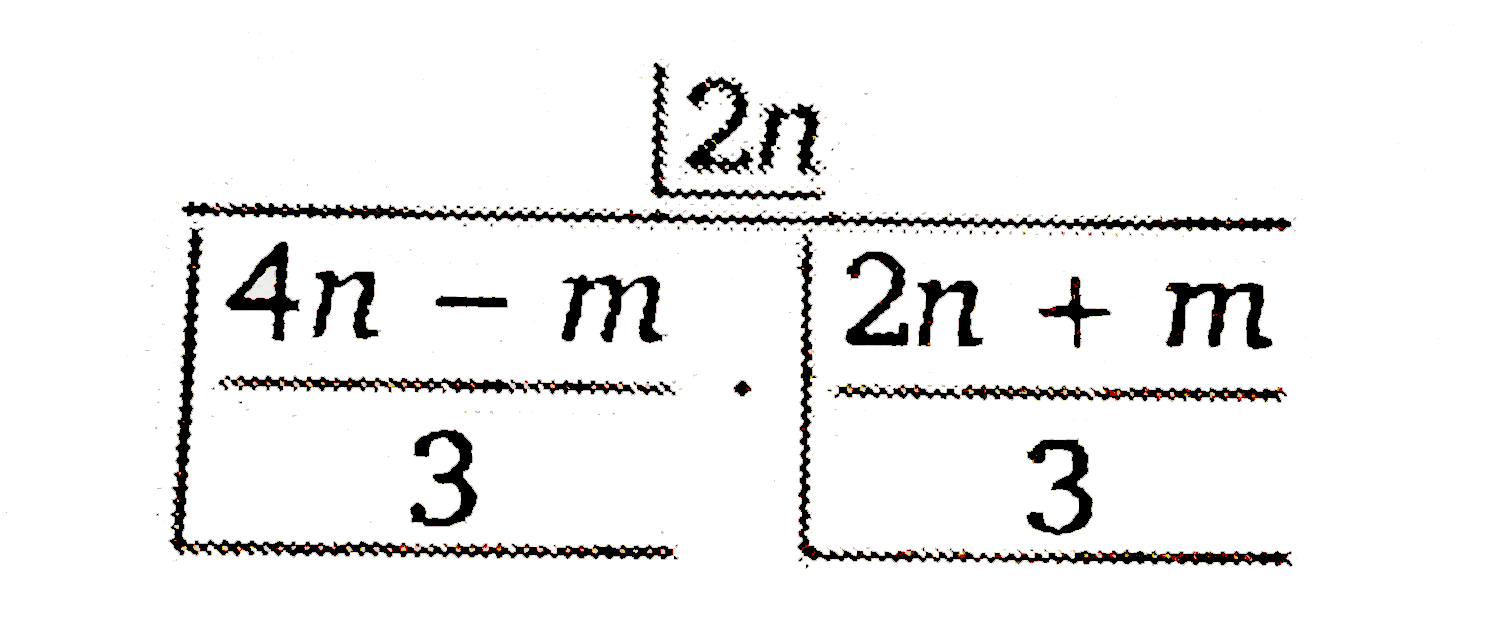The coefficient of xnin the expansion of
(1+x1−x)2, is
n
2n
3n
4n
The correct Answer is:d
To find the coefficient of xn in the expansion of (1+x1−x)2, we can follow these steps:
Step 1: Rewrite the expression
We start with the expression:
(1+x1−x)2
This can be rewritten as:
(1+x)2⋅(1−x)−2
Step 2: Expand (1+x)2
Using the binomial theorem, we expand (1+x)2:
(1+x)2=1+2x+x2
Step 3: Expand (1−x)−2
Using the binomial series expansion for (1−x)−n, we have:
(1−x)−2=∞∑k=0(k+11)xk=∞∑k=0(k+1)xk
This gives us the series:
1+2x+3x2+4x3+…
Step 4: Multiply the expansions
Now we multiply the two expansions:
(1+2x+x2)(1+2x+3x2+4x3+…)
We need to find the coefficient of xn in this product.
Step 5: Identify the contributions to xn
To find the coefficient of xn, we consider the contributions from:
1. 1 from (1+x)2 and the coefficient of xn from (1−x)−2, which is n+1.
2. 2x from (1+x)2 and the coefficient of xn−1 from (1−x)−2, which is n.
3. x2 from (1+x)2 and the coefficient of xn−2 from (1−x)−2, which is n−1.
Step 6: Combine the contributions
Thus, the coefficient of xn is:
(n+1)+2n+(n−1)=n+1+2n+n−1=4n
Final Answer
The coefficient of xn in the expansion of (1+x1−x)2 is:
4n
We start with the expression:
(1+x1−x)2
This can be rewritten as:
(1+x)2⋅(1−x)−2
Using the binomial theorem, we expand (1+x)2:
(1+x)2=1+2x+x2
Using the binomial series expansion for (1−x)−n, we have:
(1−x)−2=∞∑k=0(k+11)xk=∞∑k=0(k+1)xk
This gives us the series:
1+2x+3x2+4x3+…
Now we multiply the two expansions:
(1+2x+x2)(1+2x+3x2+4x3+…)
We need to find the coefficient of xn in this product.
To find the coefficient of xn, we consider the contributions from:
1. 1 from (1+x)2 and the coefficient of xn from (1−x)−2, which is n+1.
2. 2x from (1+x)2 and the coefficient of xn−1 from (1−x)−2, which is n.
3. x2 from (1+x)2 and the coefficient of xn−2 from (1−x)−2, which is n−1.
Thus, the coefficient of xn is:
(n+1)+2n+(n−1)=n+1+2n+n−1=4n
The coefficient of xn in the expansion of (1+x1−x)2 is:
4n
Topper's Solved these Questions
- BINOMIAL THEOREM AND ITS APPLCIATIONS Book:OBJECTIVE RD SHARMA ENGLISHChapter:BINOMIAL THEOREM AND ITS APPLCIATIONS Exercise:Section I - Solved Mcqs
Explore 100 Videos
- BINOMIAL THEOREM AND ITS APPLCIATIONS Book:OBJECTIVE RD SHARMA ENGLISHChapter:BINOMIAL THEOREM AND ITS APPLCIATIONS Exercise:Section I - Assertion Reason Type
Explore 13 Videos
- CARTESIAN CO-ORDINATE SYSTEM Book:OBJECTIVE RD SHARMA ENGLISHChapter:CARTESIAN CO-ORDINATE SYSTEM Exercise:Exercise
Explore 27 Videos
Similar Questions
Knowledge Check
The coefficient of xn in the expansion of (1+x)(1−x)n is
An(n2+2)(3n+1)24Bn(n2−1)(3n+2)24Cn(n2+1)(3n+4)24DNone of these
The coefficient of xn in the expansion of loga(1+x) is
View SolutionThe coefficient of xn in the expansion of (1+x)(1−x)n is
View SolutionThe coefficient of xn in the expansion of 1(1−x)(3−x), is
View SolutionIf 'n' is a positive integer then prove that the coefficient foxm in the expansion of (x2+1x)2n is :

View SolutionIf 'n' is a positive integer then prove that the coefficient foxm in the expansion of (x2+1x)2n is :

View SolutionThe coefficient of x9 in the expansion of 1−5x1+x is
View SolutionFind the coefficient of xn in the expansion of (1+x)(1+x)n.
View Solution